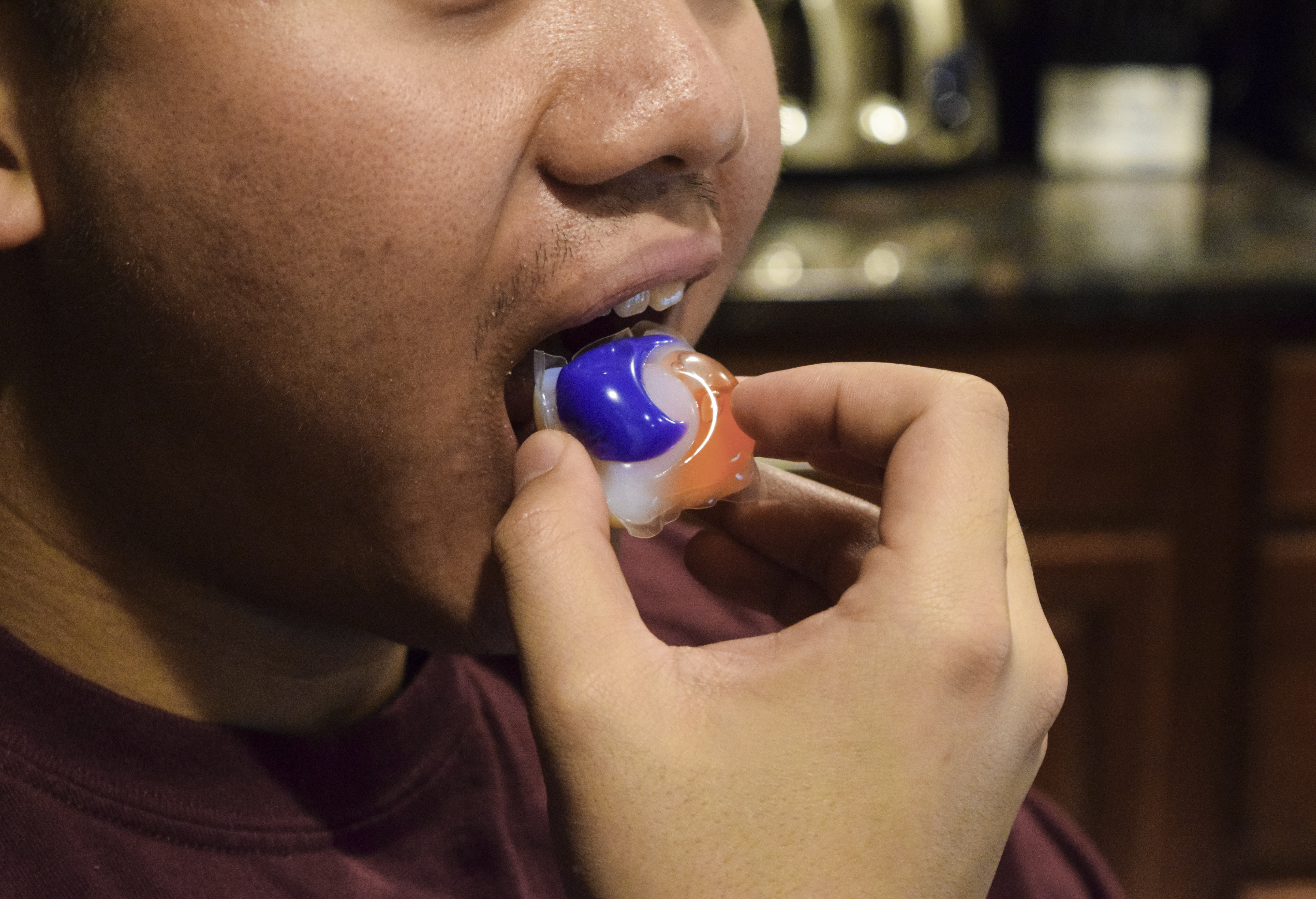Short and looks sweet, but please do not eat
Photo by Anna Messick | The trend of eating Tide Pods has gone out of control recently
Viral challenges have come and gone over the years, each testing the boundaries of the human body and spirit. Some tested the extreme, such as planking in and on strange locations. Others were beneficial in raising awareness for illness and disease, like the “ALS Ice Bucket Challenge.” Many were just plain strange, including the “Harlem Shake” and the “Running Man Challenge.” However, one new challenge is spreading like wildfire and has many scratching their heads in worried disbelief as they watch people willingly eat liquid laundry detergent pods for Internet fame.
The “Tide Pod Challenge” is a viral eating challenge that involves people attempting to ingest liquid laundry detergent pods made by the Procter & Gamble’s Tide brand. Like other eating challenges, the challenge involves people filming themselves or others eating something that is typically not supposed to be consumed in large doses in a short amount of time, or rather, be consumed at all. Past viral eating challenges have included eating saltine crackers or drinking a gallon of milk in a short and limited time. While these eating challenges were certainly, well, challenging they featured items that were at least edible. However, Tide Pods are quite the opposite and ingesting one can have serious consequences for your health.
“[Eating Tide Pods] causes severe burning of the mouth, the esophagus, and the stomach,” Medical Director for Student Health Services, Chris Nasin, said. “It can cause respiratory compromise. The oral burning can be so severe that they can stop breathing and lose an airway.”
Nasin explained that according to the American Association of Poison Control Centers (AAPCC), there were 39 reported cases of intentional liquid detergent capsule ingestion in 2016, while in 2017 there were 53 reported cases. In the first two weeks of 2018, there were 39 reported cases, matching the entire number of reported cases two years prior.
Nasin said that before the Tide Pod craze, ingesting liquid laundry detergent pods was mainly an issue of younger children and elderly adults with cognitive impairments, such as Alzheimer’s disease, confusing them with candy or food. Nasin first heard of this trend from his teenage daughters. He believes that with the increasing amount of attention that eating Tide Pods has gotten over the recent months, social media has been a leading influence on people thinking it is a great idea to consume them.
“I think people of all ages do silly things, they’re pressured, there are bragging rights,” Nasin said. “I think that these type of challenges are basically made a lot easier when you have social media because it connects giant groups of people. It’s technology that makes these things easier to catch on and cause kind of a craze.”
Ellen Reynolds, director of Student Health Services, said in her past experiences she has seen consuming liquid laundry detergent with an attempt to harm oneself. However, she remains baffled as to why people, specifically young adults, are filming themselves willingly consuming these pods.
“They are made for a purpose: to clean clothes,” Reynolds said. “Some have fabric softeners in them and others [have] spot removers that can be particularly dangerous.”
Reynolds said that she is glad that YouTube, where the majority of these videos are being uploaded, has taken a strict stance on the pressing issue by taking down any video that features people talking about or ingesting Tide Pods. She believes that this move is socially responsible and social media sites need to continue doing this.
“Sometimes young people think something is unique or creative and [we] don’t know why they do it,” Reynolds said. “But whenever we can take it off [social media] so others aren’t copying that behavior it would be good and socially responsible.”
Reynolds also brought up Patriots Tight End Rob Gronkowski, who recently partnered with the Tide brand to encourage people not to poison themselves by eating Tide Pods. If popular and impressionable celebrities such as Gronkowski can spread that message to the younger public, getting the impression that eating Tide Pods might be eradicated for good. Reynolds was inclined to agree.
“Although the Patriots had a terrible loss [in the Super Bowl], we can be thankful that Rob Gronkowski did his little pitch,” Reynolds said with a laugh.
Students around the University of Rhode Island tend to agree that eating Tide Pods is not a smart decision. Katherine Mendez, a junior at URI, thought it was ironic that there were so many Tide commercials for their liquid detergent, and not the pods, during the Super Bowl as she believed they were trying separate themselves from the pods.
“It’s a meme that’s gone too far,” said Mendez. She also said that she does not find the challenge humorous in the slightest bit.
Junior Riley Brooks echoed similar sentiments over eating Tide Pods, calling it “pretty stupid.” Brooks said he has seen recipes online for food that looks like Tide Pods, such as seeing a recipe for Jell-O that looks like a normal Tide Pod. He said that seeing things like that online only encourages people to consume Tide Pods.
“I know it’s a big joke and it can be dangerous, but people our age might not understand that there are serious issues associated with it,” Brooks said. “You don’t want to influence younger people.”
Viral challenges come and go, and it is safe to assume the “Tide Pod Challenge” will fade into the Internet graveyard soon enough. However, it’s important to remember that eating Tide Pods has serious health risks that can be fatal and are not worth the retweets, shares and likes. So please, put Tide Pods in a washing machine and not in your mouth.

